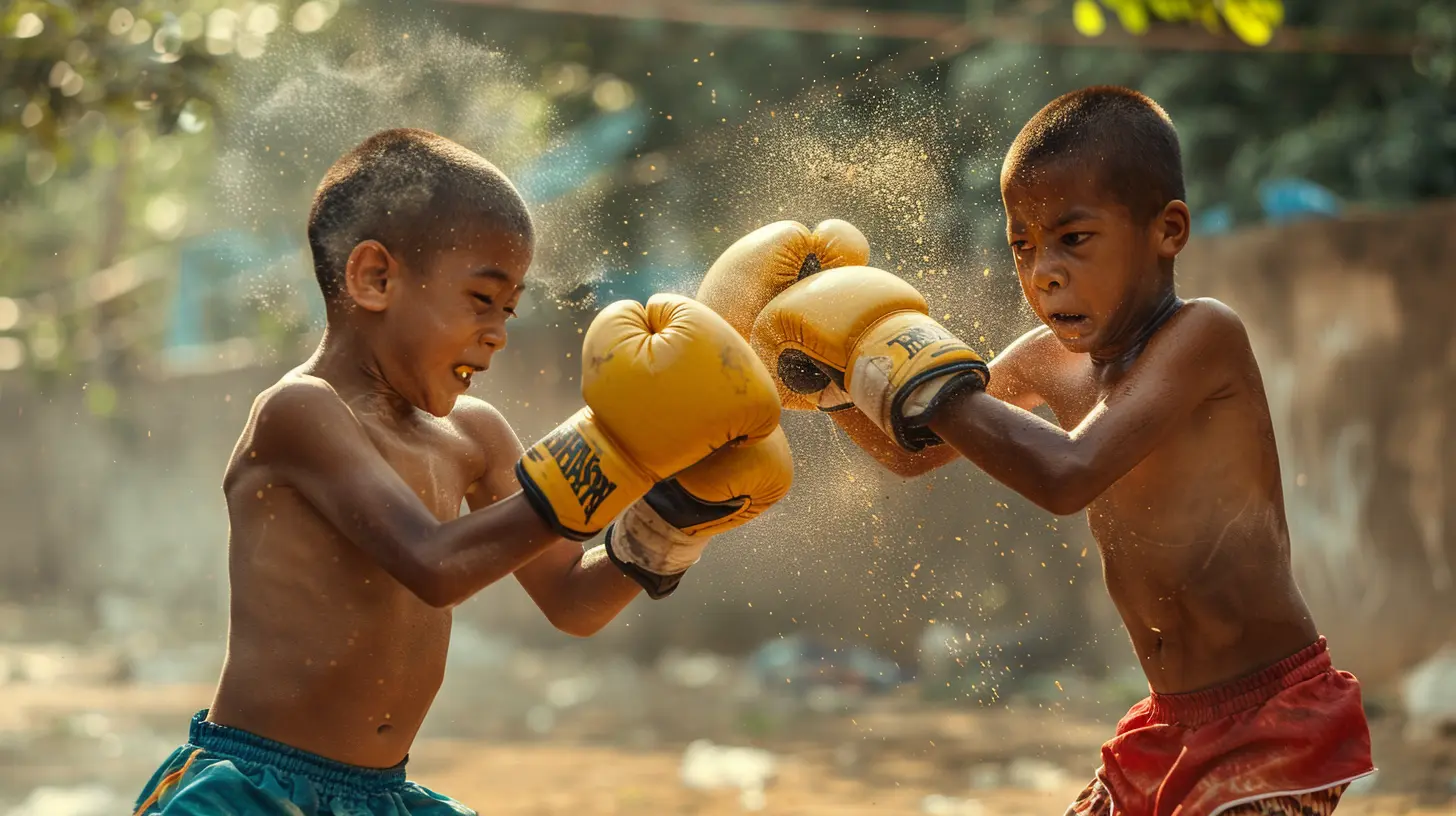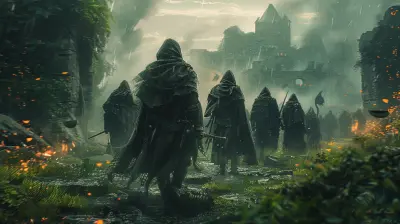Encouraging Good Sportsmanship Through Competitive Play
27 August 2025
Let’s be real—whether you're a hardcore gamer who logs hours every day or someone who just jumps in for the occasional match, we’ve all felt that rush when the stakes are high. Competitive gaming can be incredibly thrilling, but let’s not sugarcoat it: it can also bring out the absolute worst in people. We've seen it—rage quitting, toxic chat messages, trolling, and blaming teammates for losses. And while winning is sweet, how you handle the win (or the loss) says a lot more about you than the score ever will.
So, why does sportsmanship matter in gaming? And how do we encourage it in a space that thrives on competition? That’s exactly what we’re diving into.
What Exactly Is Good Sportsmanship?
Before we talk about how to encourage it, let's break down what it actually means. Good sportsmanship isn’t just shaking virtual hands after a match or typing “gg” (good game) in the chat—even though that helps. It’s about respect. Respect for your opponents, your teammates, and even yourself.It’s speaking up without trash-talking, giving credit where it’s due, and not letting anger control your actions. When you play fair, handle frustration like an adult, and celebrate others’ victories alongside your own—you’re showing good sportsmanship.
In the gaming world, where anonymity and distance can amplify negativity, this kind of behavior stands out like a rare drop in a loot box.
Why Competitive Play Can Make (or Break) Sportsmanship
Let’s face it—competitive modes are intense. You're ranked. You're scored. You're judged. For a lot of gamers, ranked modes feel like the digital equivalent of walking into a gladiator arena.And you know what? That pressure can twist even the nicest gamer into a keyboard warrior full of salty remarks.
But here’s the kicker: competitive play doesn’t have to kill sportsmanship. In fact, it can actually be one of the best environments to build it.
Think about real-world sports. Competition creates camaraderie. It teaches you how to win gracefully and lose with dignity. It highlights your weaknesses and challenges you to improve.
So, why should gaming be any different?
The Ripple Effect of Good Behavior
Ever heard the phrase “monkey see, monkey do”? Well, people mimic behavior—especially in gaming communities. You show maturity and kindness, and chances are, others will follow.Now imagine a few players in every lobby showing respect, complimenting each other's skills, and not flipping out over a bad round. That kind of vibe spreads like wildfire. It sets the tone. It creates a culture.
This ripple effect is powerful. Good sportsmanship doesn't just make you feel better—it actively improves the community you're part of.
Ten Ways To Promote Good Sportsmanship In Competitive Gaming
Wanna make the gaming world a better place? Here are ten easy (and actually effective) ways to push for better sportsmanship while you’re climbing the ranks:1. Lead By Example
You can’t expect others to behave if your own attitude stinks. Be the teammate you wish you had. Stay positive, even if your team is getting clobbered.2. Use Voice Chat Wisely
Trash talk might feel satisfying in the moment, but it adds nothing to your gameplay. Instead, use comms to share strategies, call out good plays, and encourage teammates. A little positivity goes a long way.3. Celebrate The Other Team’s Skills
Got wrecked by someone with god-tier aim? Say so. Seriously. Giving props fosters mutual respect—and makes the loss sting a little less.4. Don’t Tilt—Reset
We all have bad days. But if you start spiraling, take a breather. Don’t spread your bad vibes to the whole team. Sometimes a deep breath (or a snack break) is all you need.5. Mute When You Need To
Let’s be honest—some players are just toxic. Instead of joining the chaos, hit that mute button. Protect your peace and keep your focus on the game.6. Teach New Players
Remember being new? How confusing and frustrating it was? Be the mentor instead of the critic. Helping someone learn builds community and boosts morale.7. Report With Integrity
Use the report button for real offenses—hacking, racism, etc.—not just because someone played poorly. Weaponizing reporting ruins the system.8. Reflect After Every Game
Win or lose, ask yourself: Did I play fairly? Did I treat others with respect? If the answer is no, it’s not too late to do better next time.9. Encourage Your Teammates
You’d be shocked how much a “nice try!” or “great save!” changes the tone of a match. Reinforcing good play boosts teamwork and morale.10. Stay Humble in Victory
Nobody likes a sore loser—but being a sore winner is just as bad. Don’t gloat. Don’t rub it in. Enjoy the win, then move on.Game Developers’ Role in Fostering Sportsmanship
The culture of competitive play isn't only shaped by players—developers play a huge role too. Smart devs integrate features that reward positive behavior and penalize toxicity.Let’s look at a few standout examples:
- Honor Systems (like in League of Legends): These reward players for positive behavior and teamwork.
- Reputation Scores (like in Overwatch 2): Encouraging good conduct through visible credibility.
- Post-Game Commendations: Games that allow players to commend others promote positive feedback loops.
Also, anti-toxicity bots and moderation tools are huge. AI that filters out hate speech or alerts mods when things get out of hand? That’s how you clean house.
Game designers can also encourage sportsmanship by crafting game modes that require collaboration, creative problem-solving, or shared objectives—making cooperation essential, not optional.
Case Study: The Evolution of Sportsmanship in Esports
Remember the early days of esports? Toxicity was almost the norm. But fast forward to now, and the industry’s changing. Why? Because eyes are on the players—millions of them.Top-tier pros are now influencers. Their behavior—good or bad—gets amplified fast.
Organizations like Riot, Valve, and Blizzard have started enforcing codes of conduct. Players now face bans, fines, or suspensions for poor sportsmanship. And while some argue it's restrictive, many agree it sets a much-needed standard.
Plus, streamers and content creators are helping steer the culture. When big names speak out against toxicity, it shifts the narrative. It tells fans: “Hey, we can be competitive without being jerks.”
Teaching Young Gamers The Right Way To Compete
Let’s not overlook the next generation. Kids are gaming earlier than ever, and they’re watching how the rest of us behave.Parents, older siblings, and even streamers have a responsibility here. Teach kids the value of teamwork, practice, and humility. Celebrate effort over just winning. Praise fair play, not that one lucky shot.
Think of it like this: gaming is the new playground. Just like we teach kids to share and not push on the swings, we need to teach them to respect their digital playmates.
Wrapping It All Up
Gaming—especially competitive gaming—is an emotional rollercoaster. There are highs, lows, rage-inducing losses, and nail-biting wins. But how we ride that rollercoaster is what defines us.Encouraging good sportsmanship through competitive play isn’t about being soft or taking the edge off the competition. It’s about elevating the experience for everyone involved. It’s about making the community stronger, more supportive, and—let’s be honest—way more fun.
So the next time you load into a ranked match, remember: skill gets you wins, but sportsmanship earns you respect.
Let’s raise the bar. Together.
all images in this post were generated using AI tools
Category:
Games For KidsAuthor:

Emery Larsen
Discussion
rate this article
2 comments
Daria McCool
Thank you for this insightful article! Promoting good sportsmanship is crucial in competitive play. Encouraging respect and camaraderie not only enhances the gaming experience but also fosters a positive community. Looking forward to seeing more discussions on this important topic!
January 14, 2026 at 4:03 PM

Emery Larsen
Thank you for your thoughtful feedback! I'm glad you found the article insightful, and I completely agree—promoting good sportsmanship is vital for a positive gaming community. I appreciate your support and look forward to more discussions on this topic!
Molly Dorsey
True competition thrives on respect, not just victory.
September 2, 2025 at 2:56 PM

Emery Larsen
Absolutely! Respect fosters healthy competition, enhancing the experience for everyone involved.


